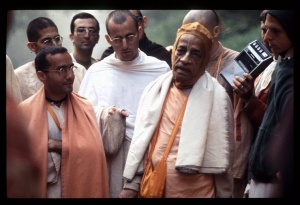CC Madhya 19.132: Difference between revisions
No edit summary |
(Vanibot #0054 edit - transform synonyms into clickable links, which search similar occurrences) |
||
| Line 17: | Line 17: | ||
<div class="synonyms"> | <div class="synonyms"> | ||
''ei-kathā śuni’'' | ''[//vanipedia.org/wiki/Special:VaniSearch?s=ei&tab=syno_o&ds=1 ei]-[//vanipedia.org/wiki/Special:VaniSearch?s=kathā&tab=syno_o&ds=1 kathā] [//vanipedia.org/wiki/Special:VaniSearch?s=śuni’&tab=syno_o&ds=1 śuni’]'' — hearing this news; ''[//vanipedia.org/wiki/Special:VaniSearch?s=mahāntera&tab=syno_o&ds=1 mahāntera]'' — of all the devotees; ''[//vanipedia.org/wiki/Special:VaniSearch?s=mahā&tab=syno_o&ds=1 mahā]-[//vanipedia.org/wiki/Special:VaniSearch?s=sukha&tab=syno_o&ds=1 sukha]'' — great pleasure; ''[//vanipedia.org/wiki/Special:VaniSearch?s=haya&tab=syno_o&ds=1 haya]'' — was; ''[//vanipedia.org/wiki/Special:VaniSearch?s=caitanyera&tab=syno_o&ds=1 caitanyera]'' — of Lord Caitanya Mahāprabhu; ''[//vanipedia.org/wiki/Special:VaniSearch?s=kṛpā&tab=syno_o&ds=1 kṛpā]'' — mercy; ''[//vanipedia.org/wiki/Special:VaniSearch?s=yāṅhe&tab=syno_o&ds=1 yāṅhe]'' — on whom; ''[//vanipedia.org/wiki/Special:VaniSearch?s=tāṅhe&tab=syno_o&ds=1 tāṅhe]'' — in him; ''[//vanipedia.org/wiki/Special:VaniSearch?s=ki&tab=syno_o&ds=1 ki]'' — what; ''[//vanipedia.org/wiki/Special:VaniSearch?s=vismaya&tab=syno_o&ds=1 vismaya]'' — wonderful. | ||
</div> | </div> | ||
Latest revision as of 22:25, 19 February 2024

A.C. Bhaktivedanta Swami Prabhupada
TEXT 132
- ei-kathā śuni’ mahāntera mahā-sukha haya
- caitanyera kṛpā yāṅhe, tāṅhe ki vismaya?
SYNONYMS
ei-kathā śuni’ — hearing this news; mahāntera — of all the devotees; mahā-sukha — great pleasure; haya — was; caitanyera — of Lord Caitanya Mahāprabhu; kṛpā — mercy; yāṅhe — on whom; tāṅhe — in him; ki — what; vismaya — wonderful.
TRANSLATION
When the personal associates of Śrī Caitanya Mahāprabhu would hear of the activities of Rūpa and Sanātana Gosvāmīs, they would say, “What is wonderful for a person who has been granted the Lord’s mercy?”
PURPORT
Śrīla Rūpa Gosvāmī and Sanātana Gosvāmī had no fixed residence. They stayed beneath a tree for one day only and wrote huge volumes of transcendental literature. They not only wrote books but chanted, danced, discussed Kṛṣṇa and remembered Śrī Caitanya Mahāprabhu’s pastimes. Thus they executed devotional service.
In Vṛndāvana there are prākṛta-sahajiyās who say that writing books or even touching books is taboo. For them, devotional service means being relieved from these activities. Whenever they are asked to hear a recitation of Vedic literature, they refuse, saying, “What business do we have reading or hearing transcendental literatures? They are meant for neophytes.” They pose themselves as too elevated to exert energy for reading, writing and hearing. However, pure devotees under the guidance of Śrīla Rūpa Gosvāmī reject this sahajiyā philosophy. It is certainly not good to write literature for money or reputation, but to write books and publish them for the enlightenment of the general populace is real service to the Lord. That was Śrīla Bhaktisiddhānta Sarasvatī’s opinion, and he specifically told his disciples to write books. He actually preferred to publish books rather than establish temples. Temple construction is meant for the general populace and neophyte devotees, but the business of advanced and empowered devotees is to write books, publish them and distribute them widely. According to Bhaktisiddhānta Sarasvatī Ṭhākura, distributing literature is like playing on a great mṛdaṅga. Consequently we always request members of the International Society for Krishna Consciousness to publish as many books as possible and distribute them widely throughout the world. By thus following in the footsteps of Śrīla Rūpa Gosvāmī, one can become a rūpānuga devotee.